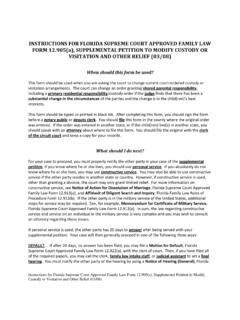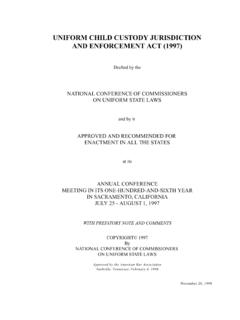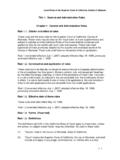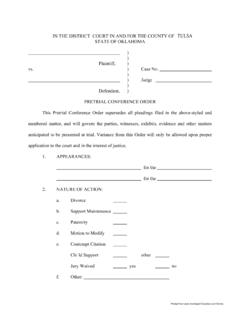Transcription of INSTRUCTIONS FOR PREPARING DECLARATION ... - Custody …
1 1983, 1995, 1997, 2007 Leslie Ellen ShearINSTRUCTIONS FOR PREPARING DECLARATIONR ough Draft Due Date_____Appointment to Review and Revise DeclarationDate_____ Time_____Your DECLARATION is your written testimony, submitted to the Court underpenalty of perjury. It has the same legal effect as your testimony on thewitness stand. Under certain circumstances, the Court may decide a casepartially or entirely upon the written declarations, without hearing any livetestimony. Family Law Courts are very crowded, and some judicial officers relyheavily on written declarations. if your case is one of the rare ones that goesup on appeal, the record must contain sufficient evidence to support yourcontentions and when there will be oral testimony, your DECLARATION is an opportu-nity to present evidence on your behalf which may serve as an introduction tothe case for the judge, a Conciliation Court mediator, and/or expert witnesses,such as a court-appointed expert who will perform a child Custody DECLARATION will also be read and remembered by the other party tothe case and his or her lawyer.
2 When filed with the Court, it will become part ofthe public record, available to any person who chooses to pull your file. Undercertain unusual circumstances, it is possible to obtain an order sealing these guidelines, I have provided an outline to follow for a declara-tion regarding parenting plan issues ( Custody /visitation). I may modify oraugment this outline to obtain facts concerning particular issues in yourindividual time to time, you may have to update your DECLARATION or submit asupplemental DECLARATION . It is essential to keep a journal of events whichaccurately relates what occurs from day to day as it relates to the issues setforth below, or anything else like oral testimony, declarations are subject to the rules of order to make sure that your testimony is not excluded, please follow Write truthfully.
3 Whether written or oral, your testimony is givenunder oath. Perjury is a crime. If your litigation is contested, the other side isgoing to review your DECLARATION carefully, hoping to discredit all of it byfinding some part that is not true. If you are not certain about something, use phrases like approxi-mately, about, to the effect of, etc. to make it clear that you are recon-structing from memory. Do not color events in your favor, speculate orexaggerate. Indicate whether events are unusual or part of the regular pattern. 1983, 1995, 1997, 2007 Leslie Ellen Shear2. Include only information which is based upon your personal means events which you have observed, not those which other peoplehave told you about. Testimony is generally limited to firsthand :a. You may include statements made to you by parties to the case,or by others speaking on their You may include things told to you by your child if they are beingused to show the child's state of mind, or the basis for your concern.
4 TheCourt will not be able to consider such statements for the truth of theircontents, but can consider them as indicating the impact of the problemsituation on your You may include things told to you by others to show your stateof mind, the or information you considered, or the reason you took a certainaction. Similarly, you may include things said to the other party to your casefor the same, limited purpose. How you make decisions about your children isan important component of your parenthood. Use your DECLARATION as anopportunity to show your approach to parenthood, and how child-centeredand attuned your decisionmaking Write as objectively and specifically as possible about events. Like areporter, you should state clearly who did or said what, when, and where. Testi-mony is not argument, but you may include an explanation of why you took aparticular action or are asking the court to make a certain order.
5 Give the underlying facts, not a conclusion or characterization. Forexample, instead of saying that Petitioner was drunk, say, I observed Peti-tioner drink a six- pack of beer over a one-hour period. Her speech wasslurred, her face was red, and she was unsteady on her feet. She then an-nounced that she planned to leave, and drive the children to the mall. When you do set forth a conclusion, give some specific examples ofevents which illustrate your can write more subjectively about your own state of mind and yourrelationship with your children. Similarly, you can write about the children forthe purpose of demonstrating to the Court how well you know and Provide copies of letters, or other documents as exhibits if they helpback up some of the points in your DECLARATION . 5. Include material that is for my background information only, butclearly indicate what may be included in your DECLARATION , and what is intendedas background information.
6 I will be using your work as a starting point, whichI will edit and augment based upon the facts you tell me. You will, of course,review the final product before signing it. 1983, 1995, 1997, 2007 Leslie Ellen Shear6. Don't worry about perfection. I will carefully edit your rough on the side of including more, rather than less, information. I read quickly,and I use your draft for background information, even if I decide to provide ashorter version for the ask for a written draft of your DECLARATION because it allows you timeto think things over, and takes less of my time (and thus your funds) to workwith. However, many people are more comfortable talking than writing. If thisis so, you may wish to dictate your DECLARATION on tape and have a secretarialservice transcribe it. Alternately, we can schedule two or three hours for amore detailed interview and drafting of your Sometimes a picture is worth a thousand words.
7 For example, if oneparent alleges that a child is upset or afraid of the other parent, a recent photoof a relaxed and loving moment may be effective. Restrained use of photo-graphs can help those working with your family to see your children as individ-uals, rather than as generic If you have access to a computer, please provide me with yourdeclaration on disk. I have WordPerfect on both IBM and Macintosh comput-ers, and can convert from most other commonly used word processingformats. Be sure to give me a print-out as well. Please virus-check. You canalso attach a document to an E-Mail Allow yourself enough quiet time to work through this. Many peoplefind this a particularly painful task. If so, and time permits, do it in small piecesrather than all at once. Feel free to call if you have Special INSTRUCTIONS : 1983, 1995, 1997, 2007 Leslie Ellen ShearDECLARATION OUTLINE1.
8 Introductory facts: Identify yourself, the children's other parent, andthe children. Describe the situation in a :Respondent, Jan Doe (Jan) and I are the parents of Dan, born Jan. 1, 1983,age 12; Stan, born Jan. 2, 1985, age 10; and Fanny, born Nov. 3, 1994, age twomonths. Jan has another son, Manny, age 15, from an earlier separated two weeks ago, and the children have spent approximatelyequal amounts of time with each of us since then, but we have no organizedparenting plan and negotiating a schedule on a day to day basis is is a traveling salesperson for a large corporation. I have a homebased business as a freelance writer. Jan has moved in with Lee, and an-nounced plans for future marriage. Lee has no children, and works in remained in the family residence, at least temporarily. Jan has moved toLee's condominium, about two miles from our Special Issues or Urgent IssuesExamples:a.
9 High level of conflict, precipitating incident or crisisb. Move-away request or oppositionc. Abuse, violenced. Mental health, substance abuse or other problemse. Child's needs not being metf. Exclusion from child's life/alienationg. Child at immediate risk because:h. Parents unable to select school, make health care decisions orother Parenting during the marriage/relationship: [If you are not yet separated, or only recently separated, provide lots of detailfor these sections. If this is a modification proceeding, and you have beenseparated a long time, you may treat these issues more briefly.]How have each of you participated in the children's daily care from theirbirth until separation? What was the daily routine?a. Infancy/Toddlerhood: Was the baby planned? Eagerly anticipated?Describe each parent's involvement in prenatal care, preparations for the babyand childbirth.
10 During infancy what role did each parent play in each aspect ofthe baby's care: cuddling, playing, socializing, feeding, dressing and changingdiapers, bathing, waking up in the night, buying clothing and baby items,scheduling and attending pediatric appointments, special care during illnesses,selecting nannies or babysitters, making decisions about weaning, potty 1983, 1995, 1997, 2007 Leslie Ellen Sheartraining, During the average day or week, how was responsibility for childcare allocated?b. Preschoolers: What changed at this age? How were decisionsmade about child care, preschool, schedule, discipline and routine, etc. Whoprovided opportunities for the child to interact with other children, have newexperiences, read stories, School age children: How was responsibility allocated for dailycare and supervision? Who established and maintained daily routine, madechild care arrangements, supervised homework, selected and participated inschool and enrichment activities, assisted with the child's social life, providedtransportation to events, shopped for child s needs, participated in the child'sactivities, Sensitivity to child's special needs: Who noted learning disabili-ties, special gifts or talents, psychological needs, educational needs, etc.





